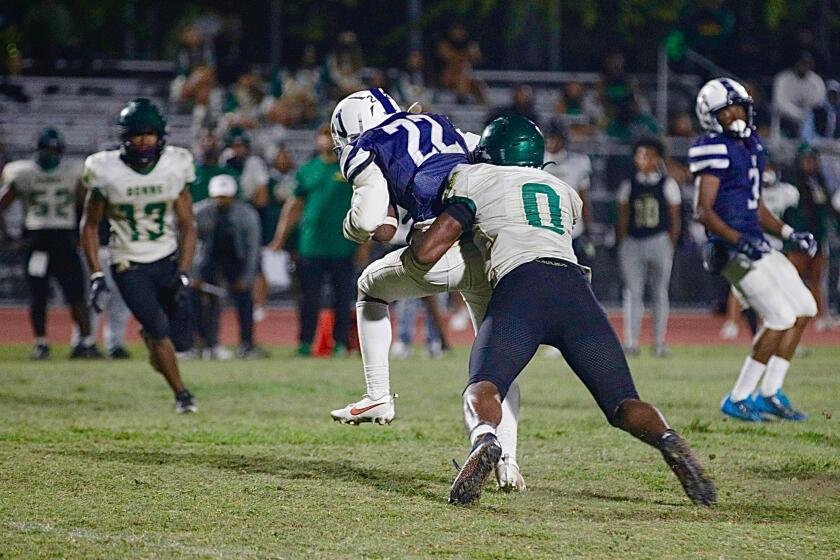NBA Offenses Are Not Fantastic
On the Sunday before the NBA All-Star game at Staples Center, the Golden State Warriors scored two points in the fourth quarter of a game they lost in overtime. âThatâs awful,â said Coach Eric Musselman.
The night before, the Miami Heat scored 64 points, the fourth-lowest total in Heat history, and shot a season-low 30.5%. âIt was an offensive disaster,â said Coach Stan Van Gundy.
Offensive disasters have not been singular occurrences this season. In the span of three weeks last fall, three NBA teams managed to score only 23 points in a half -- the fifth-lowest total since the 24-second shot clock was instituted in the 1954-55 season.
The dismal numbers reflect a two-decade-long downward trend in both scoring totals and shooting percentages across the NBA. Experts disagree on the cause, citing recently liberalized defense rules, better coaching, an overemphasis on highlight-ready dunks and even players outgrowing the court.
The consequences of this decline are also unclear. Nineteen of 29 teams report a drop in attendance, but the number of tickets sold league-wide is up. Television ratings for the 2003 NBA Finals between San Antonio and New Jersey were the lowest since the current Nielsen ratings system began 27 years ago. But ratings are up on TNT and ESPN this season.
Some experts say scoring totals have no bearing on the leagueâs popularity. But there is no disputing that points-per-game averages have fallen decisively into double-digits.
Ten years ago, 20 of the NBAâs 27 teams averaged at least 100 points and the lowest-scoring team averaged 95.1. Twenty years ago, all 23 teams averaged at least 101.5 points. This year only two of 29 teams -- Dallas and Sacramento -- are averaging over 100 points.
Russ Granik, the deputy NBA commissioner, said the league is not concerned.
âWhen you put in new rules ... the defense is going to be ahead of the offense,â he said, referring to the legalization of the zone defense in 2001. âAt this level a point here or there is not something anybody considered or was particularly an issue.â
But David Carter, a sports business consultant and USC professor, disagreed.
âI canât remember the last time someone said, âYou know, Iâd like to see a great defensive struggle,â â he said. âIf I was the NBA, Iâd be worried about the overall quality of play and of my brand.â
Several respected current and former coaches are also distressed, and offer various theories about what is behind the decline.
âBlaming TV is one easy thing,â said Johnny Bach, an assistant coach for the Chicago Bulls who has been involved with the NBA for 51 years. âIt might be a cliche but itâs also true: All TV shows is dunking so who wants to work on a jump shot?â
Laker assistant Tex Winter, innovator of the triangle offense employed by Phil Jackson with the Chicago Bulls and now the Lakers, says the belief that defense wins championships has prompted coaches to create ever-more-complicated defensive schemes.
âBut, yes, itâs a problem,â Winter said, âif no one wants to watch the games.â
There are simple solutions, these NBA veterans say -- solutions that donât involve making every player go to an Indiana farm and shoot 1,000 jump shots a day at a rickety hoop attached to a decaying garage.
For example, the NBA could wait to start that 24-second shot clock until the ball has advanced past the half-court line. And making that late-starting clock last 30 seconds would work too, says Pete Newell, the Hall of Fame coach.
Doc Rivers, former coach of the Orlando Magic and once an All-Star player, proposes using the three-point line only in the final three minutes of a game because too many bad shooters have begun relying on the three-point shot.
As a rookie in 1983, Rivers took 12 three-pointers. In the final year of his career, he took 137.
âI shouldnât have taken the [12] my first year, I shouldnât have taken the 137,â he said. âI wish someone had sat [me] on the bench each time I took the three-pointer my rookie year.
âI tell my son to watch Michael Jordan tapes. How many of Michaelâs game-winning shots were dunks or threes and how many were pull-up jump shots? He says, âJump shots, dad.â I say, âWhy arenât you working on that?â That shot is unguardable.â
But maybe nothing is wrong. Jack Ramsay, who coached Portland to the 1977 championship and has written books on coaching defense, says the game is fine.
âWhatâs wrong with well-played defense?â Ramsay asked. âI like the game. Rules changes have forced teams to play a more complete game and I think thatâs good. Watching games now, thereâs more demanded of teams on offense. Thereâs no reason why the best players on the planet canât make the adaptation necessary for whatever defenses are put out there.
âYou want to see more offense? Watch the All-Star game. Is that what you want all the time?â
Maybe. TV ratings were good for last weekâs 136-132 West win over the East at Staples Center.
Newell, for his part, said he doesnât watch the NBA ânearly as much as I used to,â and that âI have so many people tell me they canât stand to watch the NBA because itâs dribble, dribble, dribble, shoot a bad shot.â
Pepperdine Coach Paul Westphal proposes some radical solutions.
âPlayers are bigger, stronger, quicker than they ever been,â he said. âThe court is too small. Iâve told this to [NBA Commissioner] David Stern. Itâs easy. Four-on-four basketball. ... If you have four-on-four, the game opens up automatically, you have a higher-velocity game.â
A more realistic option -- a wider, longer court -- can be accomplished without costing arena owners any of those money-making floor-level seats, says Westphal, a former NBA star and coach. On this bigger court, he envisions players behind the basket, like hockey players behind the net, creating clever passing angles.
Also, Westphal says, protect the fastbreak. âEvery time thereâs a steal and a break, somebody grabs the guy,â he said. âMake the penalty so severe that stuff stops.â
Winter says that practically every team runs the same generic offensive plays. âSo the other team knows what youâre going to run and it gets more and more difficult to get a good shot off,â he said.
The highest-scoring teams move their players and the ball around aggressively, he pointed out.
âTo me, thatâs the way weâre supposed to play. But weâre playing the other way,â Winter said. âI canât speak for all fans, but for me, the game is not as interesting a game as it used to be.â
Paul Swangard, managing director of Warsaw Sports Management at the University of Oregon, said that type of thinking is old-fashioned.
âScoring is not the primary driver of NBA TV or attendance ratings,â he said. âWhat people buy into is the NBA as the best basketball product in the world. Lack of scoring would be a much bigger issue in a league like the NHL or soccer where they are trying to reach a new audience.â
Players cite the greater emphasis on defense, by both rules-makers and coaches.
âWith the man-to-man, there was a lot of individual scoring,â Orlando All-Star Tracy McGrady said. âNow, with the zone, you can have a guy like Shaquille OâNeal or any other guy and the defense can just play zone and prevent guys from scoring at will.â
Added Seattle All-Star Ray Allen: âWe donât have worse shooters. We have much better defense being coached and played.â
In the end, it is charismatic personalities and prodigious talents, rather than point totals, that will keep the league thriving, says Dean Bonham, chief executive officer of the Bonham Group, a Denver-based sports and entertainment marketing firm.
âWith LeBron James, with Carmelo Anthony, this is the start of a new era with a couple of stars who are compelling and engaging to the fans,â he said. âTheyâre going to raise the NBA up with them.â
*
(BEGIN TEXT OF INFOBOX)
Going Down
Since 1981, scoring and shooting in the NBA has drastically declined:
*--* Year Points/game FG pct. 1981-82 108.6 49.1 2003-04 92.86 43.7
*--*
More to Read
Go beyond the scoreboard
Get the latest on L.A.'s teams in the daily Sports Report newsletter.
You may occasionally receive promotional content from the Los Angeles Times.










